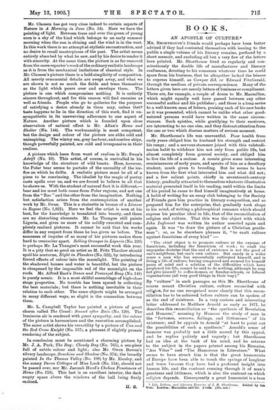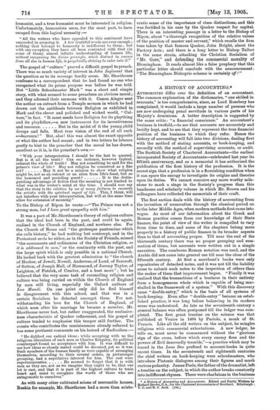AN APOSTLE OF CULTURE.* public a single volume of his
literary remains, prefaced by a short memoir, and excluding all but a very few of the letters here printed. Mr. Shorthouse lived so regularly and con- scientiously the double life of manufacturer and literary craftsman, devoting to his romances whatever time he could spare from his business, that be altogether lacked the leisure to express himself, as Cowper did, or Edward FitzGerald, through the medium of private correspondence. Many of the letters given here are merely letters of business or compliment. There are, for example, a couple of dozen to Mr. Macmillan, which might equally well have passed between any other successful author and his publisher; and there is along series to a well-known man of letters, praising each of his new books as it was presented, which cannot be unlike what other good- natured persons would have written in the same circum- stances. Such epistles, while gratifying to their receivers, are interesting to no one else, and they distractattention from the one or two which discuss matters of serious moment.
Mr. Shorthouse's life was uneventful. Poor health from early years obliged him to husband his strength and restrict his range ; and a nervous stammer joined with this valetudi. narian habit to withdraw him not only from public life, but almost completely from general society, and obliged him to live the life of a recluse. A cousin gives some interesting reminiscences of early years, and speaks of him as a desultory student, much given to brooding. But he seems to have known from the first what interested him and what did not; and a few salient points, chiefly in seventeenth-century history, gradually attracted to themselves whatever illustrative material presented itself in his reading, until within the limits of his period he came to find himself imaginatively at home. A habit of writing for an essay club belonging to the Society of Friends gave him practice in literary composition, and so prepared him for the enterprise, that gradually took shape in his mind, of writing a philosophical romance which should express his peculiar ideal in life, that of the reconciliation of religion and culture. That this was the object with which John Inglesant was written its author asserted again and again. It was "to draw the picture of a Christian gentle- man " ; or, as he elsewhere phrases it, "to exalt culture against fanaticism of every kind"
The chief object is to promote culture at the expense of fanaticism, including the fanaticism of work ; to exalt the unpopular doctrine that the end of existence is not the good of one's neighbour, but one's own culture. But surely in a wider sense a man who has successfully cultivated himself, and is living a life of culture, having conquered and secured for himself peace of mind and a solution of the difficulties which have perplexed his life, cannot be said to do nothing, although he may not give himself to coffee-houses, or Sunday-schools, or Liberal organisations (all very good things in their way)."
By "culture" in such passages as this Mr. Shorthouse of course meant Christian culture, culture reconciled with religion, for no one recognised more clearly that this recon- ciliation has to be achieved before culture can be spoken of as the end of existence. In a very curious and interesting letter addressed to Matthew Arnold as early as 1871, he describes this reconciliation as "the synthesis of Revelation and Humour," meaning by Humour the study of man in the "fortunes, sorrows, failings, and littlenesses " of his existence ; and he appeals to Arnold "at least to point out the possibilities of such a synthesis." Arnold's sense of humour was probably not a little moved by this appeal, and be replies politely and vaguely ; but Shorthouse bad an idea at the back of his mind, and he returns to the subject in the papers printed among his Remains, "Are Vitae" and "The Humorous in Literature." What seems to have struck him is that the great humourists of Europe have been able to touch the springs of laughter and tears because they have had a profound insight into
human life, and the contrast running through it of man's greatness and littleness, which is also the contrast on which religion depends. Consequently a great hmnonrist is a true • Life, Letters, and Literary Remains of J. H. Shorthouse. Edited by his Wife. London: Macmillan and Co. 2 vole, [17a. net.1 " All the writers who have appealed to this sentiment have succeeded in arousing it. A few truthful words are ever enough ; nothing that belongs to humanity is indifferent to them ; but with one exception they have all been contented with that (in some of them) almost infinite understanding of human life, without recognising the divine principle, which distinct in essence from all else in human life, is perpetually striving to enter into it."
The gospel of " culture " proved a difficult gospel to preach. There was so much variety of interest in John Inglesant that the question as to its message hardly arose. Mr. Shorthouse confesses to a correspondent that he had found no one who recognised what its prime purpose was before he was told.
But "Little Schoolmaster Mark" was a short and simple story, with what seemed to some preachers an obvious moral; and they adorned their sermons with it. Canon Ainger sent the author an extract from a Temple sermon in which he had drawn out the antithesis between Religion as exhibited in Mark and the clever and polished and wicked world, "Cul- ture," in fact. "It must needs have Religion for its plaything and its playfellow,—a new instrument for its inventiveness and resource But in the midst of it the young „child droops and falls. Most true vision of the end of all such cmaaavours ! " But, alas ! this was almost the exact opposite of what the author had meant; and in two letters he labours gently to hint to the preacher that the moral he has drawn, excellent as it is, is the preacher's own:—
" With your interpretation I should be the last to quarrel. But is it all the truth ? Can one instance, however typical, exhaust the whole of truth May not something be said for the prince's view of life ? May not religion be conceived as a fine
art? May it not be a mission to show what religion might be, not as an outcast or an alien from life's feast, but as
the honoured and presiding guest It is the distin- guishing advantage of fiction that the meaning is not limited to what was in the writer's mind at the time. I should now say that the story is the relation by me of many failures to reconcile the artistic with the spiritual aspect of life. This, I think, will not interfere with your interpretation, but will at the same time allow for extension of meaning."
To the Bishop of Ripon he wrote :—" The Prince was not a strong man, but I have great sympathy with him."
It was a part of Mr. Shorthouse's theory of religions culture that the ideal had been in the past, and could be again, realised in the Church of England, and nowhere else. For the Church of Rome and "the grotesque pantomime which she calls history," be had nothing but contempt, and in the Protestant sects he either, as in the Society of Friends, missed
" the sacraments and ordinances of the Christian religion, as it is addressed to ?nen," or the continuity with the past, and the large spirit which is only possible in a national Church. He looked back with the greatest admiration to "the church of Hooker, of Jewell, Nowell, Andrewes, of Laud, of Sancroft, of Sutton, of Joseph Hall, of Hammond, of Jeremy Taylor, of
Leighton, of Patrick, of Comber, and a host more" ; but he believed that the very same task of reconciling religion and culture was being carried on within the Church of England by men still living, especially the Oxford authors of Luz Mundi. On one point only did he find himself in disagreement with this school, and that was in a certain Socialism he detected amongst them. For not- withstanding his love for the Church of England, of which soon after his marriage he became a member, Mr. Shorthouse never lost, but rather exaggerated, the exclusive- ness characteristic of Quaker refinement, and his gospel of culture tended to emphasise this temper still further. The cousin who contributes the reminiscences already referred to has some pertinent comments on his hatred of Radicalism :—
" He disliked our radical ideas ; while accepting with us the religious liberalism of such men as Charles Kingsley, its political counterpart found no acceptance with him. It was difficult to see how ideas so closely mated could be divorced, yet so it was. Such members of the human family as were capable of arranging themselves, according to their several orders, in picturesque grouping, had a superlative interest for him. The rest were supernumeraries He seemed to forget that it is with men as they are, not as we imagine they ought to be, that our lot is cast, and that it is part of the highest culture to train heart and mind to recognise the worth of those who are antagonistic to ourselves."
As with many other cultivated scions of mercantile houses, Ruskin for example, Mr. Shorthouse had a more than aristo- eratic sense of the importance of class distinctions, and this was fortified in his case by the Quaker respect for capital. There is an interesting passage in a letter to the Bishop of Ripon, about "a thorough recognition of the relative values of the position of master and servant," which recalls the firm tone taken by that famous Quaker, John Bright, about the Factory Acts ; and there is a long letter to Bishop Talbot in the same strain, attacking the Christian Socialism of "Mr. Gore," and defending the commercial morality of
Birmingham. It reads almost like a false prophecy that this particular letter should conclude with the announcement: "The Birmingham Bishopric scheme is certainly off!"







































 Previous page
Previous page